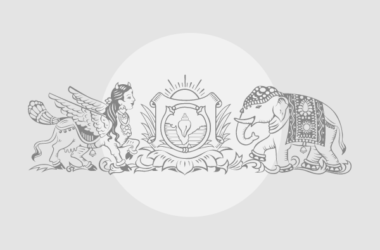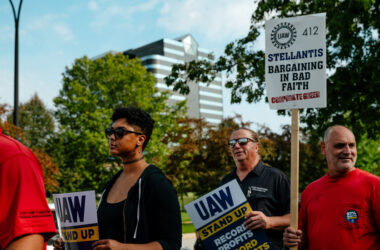Nigerians are dealing with one of many West African nation’s worst financial crises in years triggered by surging inflation, the results of financial insurance policies which have pushed the forex to an all-time low in opposition to the greenback. The state of affairs has provoked anger and protests throughout the nation.
The newest authorities statistics launched Thursday confirmed the inflation price in January rose to 29.9%, its highest since 1996, primarily pushed by meals and non-alcoholic drinks. Nigeria’s forex, the naira, additional plummeted to 1,524 to $1 on Friday, reflecting a 230% lack of worth within the final yr.
“My household is now residing at some point at a time (and) trusting God,” stated dealer Idris Ahmed, whose gross sales at a clothes retailer in Nigeria’s capital of Abuja have declined from a mean of $46 day by day to $16.
The plummeting forex worsens an already dangerous state of affairs, additional eroding incomes and financial savings. It squeezes hundreds of thousands of Nigerians already battling hardship resulting from authorities reforms together with the removing of fuel subsidies that resulted in fuel costs tripling.
Nigeria’s economic system
With a inhabitants of greater than 210 million folks, Nigeria isn’t just Africa’s most populous nation but in addition the continent’s largest economic system. Its gross home product is pushed primarily by companies resembling data know-how and banking, adopted by manufacturing and processing companies after which agriculture.
The problem is that the economic system is much from adequate for Nigeria’s booming inhabitants, relying closely on imports to satisfy the day by day wants of its residents from automobiles to cutlery. So it’s simply affected by exterior shocks such because the parallel overseas alternate market that determines the worth of products and companies.
File image of a person counting Nigerian naira notes in a market place in Yola, Nigeria
| Picture Credit score:
Reuters
Nigeria’s economic system is closely depending on crude oil, its largest overseas alternate earner. When crude costs plunged in 2014, authorities used its scarce overseas reserves to attempt to stabilise the naira amid a number of alternate charges. The federal government additionally shut down the land borders to encourage native manufacturing and restricted entry to the greenback for importers of sure gadgets.
The measures, nonetheless, additional destabilised the naira by facilitating a booming parallel marketplace for the greenback. Crude oil gross sales that enhance overseas alternate earnings have additionally dropped due to power theft and pipeline vandalism.
Financial reforms implementation
Shortly after taking the reins of energy in Could final yr, President Bola Tinubu took daring steps to repair the ailing economic system and appeal to traders. He introduced the top of pricey decadeslong fuel subsidies, which the federal government stated had been not sustainable. In the meantime, the nation’s a number of alternate charges had been unified to permit market forces to find out the speed of the native naira in opposition to the greenback, which in impact devalued the forex.
Analysts say there have been no ample measures to include the shocks that had been certain to come back on account of reforms together with the supply of a backed transportation system and an instantaneous enhance in wages.
So the greater than 200% enhance in fuel costs brought on by the top of the fuel subsidy began to have a knock-on impact on all the things else, particularly as a result of locals rely closely on gas-powered mills to gentle their households and run their companies.
Why naira is plummeting
Below the earlier management of the Central Financial institution of Nigeria, policymakers tightly managed the speed of the naira in opposition to the greenback, thereby forcing people and companies in want of {dollars} to move to the black market, the place the forex was buying and selling at a a lot decrease price.
There was additionally an enormous backlog of collected overseas alternate demand on the official market — estimated to be $7 billion — due partially to restricted greenback flows as overseas investments into Nigeria and the nation’s sale of crude oil have declined.
Authorities stated a unified alternate price would imply simpler entry to the greenback, thereby encouraging overseas traders and stabilising the naira. However that has but to occur as a result of inflows have been poor. As a substitute, the naira has additional weakened because it continues to depreciate in opposition to the greenback.
What authorities are doing
CBN Gov Olayemi Cardoso has stated the financial institution has cleared $2.5 billion of the overseas alternate backlog out of the $7 billion that had been excellent. The financial institution, nonetheless, discovered that $2.4 billion of that backlog had been false claims that it will not clear, Cardoso stated, leaving a stability of about $2.2 billion, which he stated will likely be cleared “quickly.”
Tinubu, in the meantime, has directed the discharge of meals gadgets resembling cereals from authorities reserves amongst different palliatives to assist cushion the impact of the hardship. The federal government has additionally stated it plans to arrange a commodity board to assist regulate the hovering costs of products and companies.
On Thursday, the Nigerian chief met with state governors to deliberate on the financial disaster, a part of which he blamed on the large-scale hoarding of meals in some warehouses.
“We should be sure that speculators, hoarders and hire seekers should not allowed to sabotage our efforts in making certain the vast availability of meals to all Nigerians,” Tinubu stated.
By Friday morning, native media had been reporting that shops had been being sealed for hoarding and charging unfair costs.
How Nigerians are coping
The state of affairs is at its worst in battle zones in northern Nigeria, the place farming communities are not capable of domesticate what they eat as they’re compelled to flee violence. Pockets of protests have damaged out in previous weeks however safety forces have been fast to impede them, even making arrests in some instances.
Within the financial hub of Lagos and different main cities, there are fewer automobiles and extra legs on the roads as commuters are compelled to trek to work. The costs of all the things from meals to home items enhance day by day.
“Even to eat now’s an issue,” stated Ahmed in Abuja. “However what can we do?”







